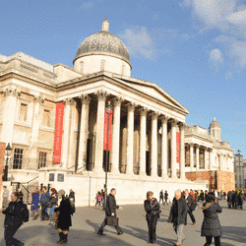A petition signed by over 133,000 people has been delivered to the National Gallery after staff went on strike over concerns about the privatisation of services.
As yesterday marked the 80th day of strikes for members of the Public and Commercial Services Union (PCS) at the National Gallery this year, an online petition set up by PCS was delivered to the National Gallery’s head of security by the union’s vice president.
Mark Serwotka, PCS general secretary, said: "We do not believe the public want to see gallery services handed to a private security company. Privatisation is unnecessary and risky at what is one of our country's greatest cultural assets."
Picket lines are being held at the gallery from 9am to 11.30am every day as the strikes continue indefinitely. Yesterday was the 23rd day of continuous strikes.
The union says it remains opposed to the “privatisation of all the gallery's visitor services and is fighting for the reinstatement of its senior representative Candy Udwin, who an interim tribunal has found was likely to have been sacked unlawfully for trade union activity in relation to the dispute”.
Of the 604 staff employed at the National Gallery, 204 are members of the PCS union. Just over 60 per cent (132 people) of the National Gallery PCS members voted to strike in the ballot, which equates to 22 per cent of all staff employed by the National Gallery.
The strikes have meant that a lot of rooms at the National Gallery have been closed to the public.
In a statement, the National Gallery said: “The PCS opposes the introduction of new working practices for some visitor facing and security staff which would enable us to operate more flexibly and deliver an enhanced service to our six million annual visitors. The National Gallery is a public asset and has a duty to ensure the collection and the gallery itself is accessible as much as possible, to as many people as possible.”
The National Gallery said that it spent more than a year negotiating with the PCS union and both parties met with Acas. It says that the PCS refused to compromise on its position or provide the Gallery with an “effective and affordable solution, one which meets the requirements expressed in the original tender document”.








